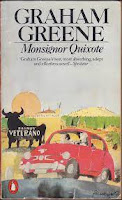Go on, I dare you to google “top 10 Terry Pratchett books”. While there are a few titles that appear with semi-regularity in such lists, it's only semi-. Otherwise, the fans of the author's works are as diverse as their beliefs what constitutes 'the best'. Reading Rob Wilkin's biography of Pratchett, he made the statement to the effect Night Watch (2002) is likely his best, and that something resembling agreement, somewhere maybe in the ballpark of consensus, was had on this idea. Wilkins as close to the inner sanctum of Pratchett as a person could be without being Pratchett himself, why not see what the fuss is about?
Night Watch is a City Watch novel. More specifically, however, it is a Sam Vines novel. In the opening scenes he joins the chase of a murderer through Ankh-Morpork, a chase that leads to the roof of the Unseen University library. In the standoff that follows, Vimes takes a blow to the head and wakes up in what at first appears to be an alternate reality. People don't recognize him, the Watch's offices don't exist, and people think he is a criminal. But it's returning to his home to discover that his wife is still a child makes Vimes understand the situation: he's in the past. Some arcane magic happened at the University. With the help of the monks of time, Vimes intends to get back to the present. But that likewise means getting through the past, again, this time as a member of the Night's Watch.










